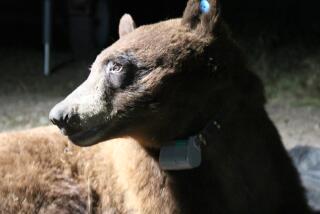Bears on the Prowl : Drought Blamed as Animals Raid Camps at Increasing Rate
- Share via
Bears in the Angeles National Forest are entering campgrounds and other recreation areas with increasing frequency, possibly forced deeper into human habitats by drought to forage for food, U.S. Forest Service officials say.
Forest Biologist Bill Brown said Monday he has noticed the trend in the last four to five years and believes it is linked to the lack of rain during that period. What’s more, Brown said, once a bear discovers a convenient source of food it will develop the memory of an elephant--returning again and again for the easy pickings.
“Because of the drought, there’s probably a reduction in the available berries and rodents and ground squirrels they normally prey on,” said Brown.
“But this is all strictly speculation at this point,” he added, joining other forest officials in laying part of the blame on careless humans who leave behind trash, food-laden picnic tables and ice chests.
Tom Paulek, field supervisor for the state Department of Fish and Game’s regional office in Long Beach, said, “the drought has certainly had some effect.” But, he added, “bears are opportunists and if there are easy food sources, they will take advantage of them.”
This summer, the Pyramid Lake, Crystal Lake, and Jackson Lake recreation areas of the Angeles National Forest appear to be most popular among the estimated 50 to 200 California black bears that live in the 650,000-acre forest, Brown said.
No injuries to humans have been reported in the Angeles National Forest. In the San Bernardino Forest, however, a bear bit a 10-year-old boy on the hand last month as he slept on a cot outdoors. Paulek said the boy may have had something sweet smeared on his hand.
Rangers and concessionaries have been forced to destroy several persistent bears in the last couple of years, including the one in the San Bernardino Forest and another last month at Verdugo Pines Camp near Wrightwood, in the Angeles National Forest.
Linda Mitchell, who has managed the camp with her husband, Stuart, for 10 years, said it was the first time they were forced to kill a bear “and we’re sorry we had to do that.”
Rangers cited several feats of bears’ strength and intelligence, including an instance last month at Crystal Lake in which a bear attempted to tear the hatchback off a car to reach a picnic cooler.
Bears quickly learn to equate coolers and other types of containers with easy food and have been known to mistake cans of tennis balls for containers of potato chips, forest officials said.
At the Pyramid Lake recreation center about nine miles south of Gorman, concessionaire Chet Roberts said bears have returned repeatedly to his snack bar for hamburger and ice cream, amazing and frustrating him with their ingenuity.
“They have torn off doors, ripped off the actual siding of the building, ripped off window frames, ripped off the air-conditioning unit and crawled through the hole,” Roberts said.
“They have also removed the exhaust system from the snack bar roof and ripped off the doors of our ice chest probably six to eight times,” he continued. “On one evening they ate about sixty pounds of hamburger meat and about $100 worth of ice cream. They’re particularly fond of our hamburgers though.”
Roberts said snack bar employees came to work one morning to find that a motorist had spent the night on the roof. The man had car trouble and ran into a bear while looking for a phone, he said.
A 15-year veteran of the lake, Roberts said he has noticed bears growing bolder over the last few years. But the frequency of bear sightings and raids appears to have doubled between last year and this summer, he said.
Ranger John Seales, who manages the Crystal Lake Recreation Area, said the number of bear “incidents” has tripled since last summer.
“The drought--that’s the basic answer I get from most experts,” said Seales. “The drought is driving them to where people are. They normally don’t like to be around people.”
Glenn Stewart, a biology professor at Cal Poly Pomona and a bear expert, said the drought theory is plausible because his studies show that most bears prefer natural sources of food--acorns, manzanita berries and choke cherries among them.
“If they can demonstrate an increase in this sort of thing, it’s hard to see anything else going on out there that’s different,” said Stewart. “This drought thing is a likely possibility.”
More to Read
Sign up for Essential California
The most important California stories and recommendations in your inbox every morning.
You may occasionally receive promotional content from the Los Angeles Times.










